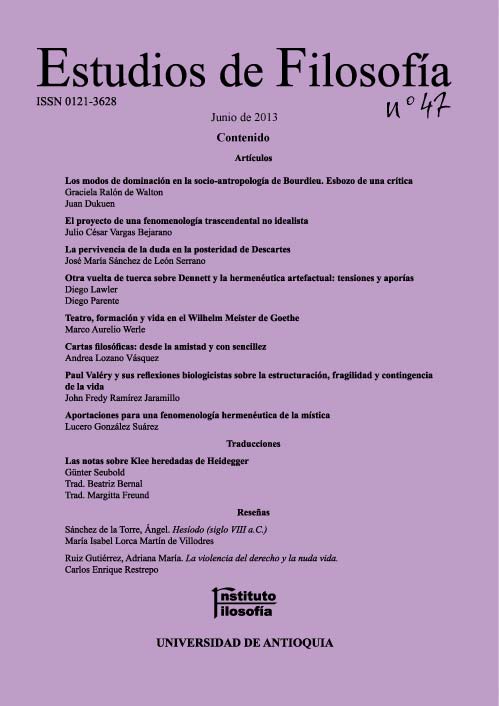Contributions to a hermeneutical phenomenology of the mystic
DOI:
https://doi.org/10.17533/udea.ef.16656Keywords:
Phenomenology, hermeneutic, ontology, mysticism, Heidegger.Abstract
The purpose of this reflection is to present some original contributions, from an ontological perspective, for the implementation of the phenomenological method to the interpretation of mystical testimonies. According to the first Heidegger, but trying to overcome its deficiencies, I propose some guidelines for the development of a hermeneutic phenomenology of mysticism, through the interpretation of those texts where the essential features of mysticism, as a modality of factual life, are expressed.
Downloads
References
GARCÍA-BARÓ, M. (2004) “Más yo que yo mismo. Un ensayo sobre los fundamentos de la filosofía de la mística”, en: Martín Velasco, J. (Éd.). La experiencia mística. Estudio interdisciplinario, Madrid: Trotta-Ayuntamiento de Ávila, pp. 285-309.
GARCÍA-BARÓ, M. (2007) De estética y mística, Salamanca: Ediciones Sígueme.
GÓMEZ CAFFARENA, J. (2006) El misterio y el enigma, Madrid: Trotta.
GONZÁLEZ SUÁREZ, L. (2011) “Del concepto onto-teo-lógico de Dios a la comprensión fenomenológica de lo divino”, en: Revista de filosofía, Universidad Iberoamericana, Vol. 43, No. 131, julio-diciembre, pp. 121-134.
HEIDEGGER, M. (1988) El ser y el tiempo, México: F.C.E.
HEIDEGGER, M. (1990) De camino al habla, Barcelona: Ediciones del Serbal.
HEIDEGGER, M. (2006) Introducción a la fenomenología de la religión, México: F.C.E.
MARTÍN VELASCO, J. (2006) Introducción a la fenomenología de la religión, Madrid: Trotta.
OTTO, R. (2007) Lo santo. Lo racional y lo irracional en la idea de Dios, Madrid: Alianza Editorial.
PERRIN, D. B. (1996) Canciones entre el alma y el esposo of Juan de la Cruz. A Hermeneutical Interpretation, San Francisco-London-Bethesda: Scholar Publications.
Downloads
Published
How to Cite
Issue
Section
Categories
License
Copyright (c) 2013 Lucero González Suárez

This work is licensed under a Creative Commons Attribution-NonCommercial-ShareAlike 4.0 International License.
Authors who publish with this journal agree to the following terms:
1. The Author retains copyright in the Work, where the term "Work" shall include all digital objects that may result in subsequent electronic publication or distribution.
2. Upon acceptance of the Work, the author shall grant to the Publisher the right of first publication of the Work.
3. The Author shall grant to the Publisher a nonexclusive perpetual right and license to publish, archive, and make accessible the Work in whole or in part in all forms of media now or hereafter known under a Creative Commons Attribution-NoCommercia-ShareAlike (CC BY-NC-SA 4.0), or its equivalent, which, for the avoidance of doubt, allows others to copy, distribute, and transmit the Work under the following conditions: (a) Attribution: Other users must attribute the Work in the manner specified by the author as indicated on the journal Web site;(b) Noncommercial: Other users (including Publisher) may not use this Work for commercial purposes;
4. The Author is able to enter into separate, additional contractual arrangements for the nonexclusive distribution of the journal's published version of the Work (e.g., post it to an institutional repository or publish it in a book), as long as there is provided in the document an acknowledgement of its initial publication in this journal;
5. Authors are permitted, and Estudios de Filosofía promotes, to post online the preprint manuscript of the Work in institutional repositories or on their Websites prior to and during the submission process, as it can lead to productive exchanges, as well as earlier and greater citation of published work (see The Effect of Open Access). Any such posting made before acceptance and publication of the Work is expected be updated upon publication to include a reference to the Estudios de Filosofía's assigned URL to the Article and its final published version in Estudios de Filosofía.















